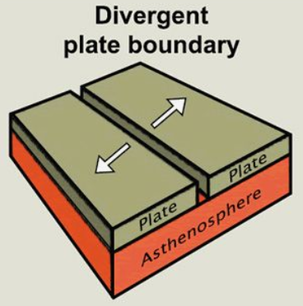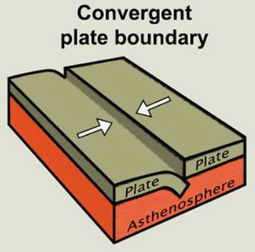Describe the movement of a divergent plate boundary using visuals or words.
The plates move away from each other.

Describe the movement of a convergent plate boundary using visuals or words.
The plates move towards each other and collide.

Describe the movement of a transform boundary using visuals or words.
Plates slide past each other.

Where can you find continental crust? Where can you find oceanic crust?
Continental crust is the land masses (continents) that we live on above the ocean's surface. Oceanic crust is the seafloor at the bottom of the ocean.

What state of matter is the inner core and outer core? (for example: liquid, solid, gas)
Outer core is liquid due to intense heat.
Inner core is solid due to intense pressure.
What are tectonic plates?
How is oceanic and continental crust different from each other in regard to age and density?
Oceanic crust is younger and more dense.
Continental crust is older and less dense.
Which type of plate boundary creates mountain ranges on land? Include the type of boundary and the type of crust involved.
Convergent boundaries between continental crust.
Why will oceanic crust always be younger than continental crust?
Oceanic crust is constantly being destroyed at convergent boundaries because it is denser and will always subduct beneath continental crust.
Which type of plate boundary do subduction zones occur at? Include the type of boundary and the type of crust involved (you will have 2 answers).
1. Convergent boundary between 2 oceanic crusts
2. Convergent boundary between oceanic and continental crust
Describe the Continental Drift Theory and name the person who created this theory.
All the continents were once part of one supercontinent called 'Pangea' and drifted away to where they are today. This theory was made by Alfred Wegener.
How does temperature impact the density of an object and how does density impact the weight of an object?
Hotter temperatures make objects LESS dense. Less dense objects are LIGHTER.
Colder temperatures make objects MORE dense. More dense objects are HEAVIER.
How are volcanic island chains such as Japan created? What type of plate boundary does this occur at? (be specific)
When 2 oceanic crusts collide at a convergent boundary, it creates a subduction zone that creates underwater volcano chains. When those volcanoes erupt, they create layers of cooled rock that become volcanic islands.
What is seafloor spreading? Which type of plate boundary does this occur at? Include the type of boundary and the crust involved.
Seafloor spreading is the process of new oceanic crust being formed when lava seeps out of a divergent boundary between 2 oceanic crusts. The lava cools and hardens over and over again, which creates new seafloor.
Why are the earthquakes at convergent and transform boundaries much stronger than the earthquakes at divergent boundaries?
At convergent and transform boundaries, two plates are grinding against each other which intense friction and pressure build up. At a divergent boundary, they're moving away so there's less friction that happens which means weaker earthquakes
What two pieces of evidence support the Theory of Continental Drift?
1. Shape of the continents
2. Fossils from the same organisms were found on different continents (the same ancient animals were found in Africa and South America along the coast line).
3. Rock layers on different continents shared the same layers, meaning they were once connected to each other.
What is the difference between a rift (valley) and a mid-ocean ridge when it comes to a divergent boundary between oceanic crust?
A mid-ocean ridge is a chain of underwater mountains that are created at divergent plate boundaries in the ocean.
A rift is the very middle of the plate boundary where the crust thins and lava seeps through.
Divergent plate boundaries are 'constructive' because they can construct or create new crust. Convergent plate boundaries are 'destructive' because they can destroy or melt crust at subduction zones.
What are 2 pieces of evidence scientists have found for seafloor spreading happening at the Mid-Atlantic Ridge?
1. The temperatures closer to the ridge are hotter.
2. The crust closer to the middle of the ridge is younger than the crust that is farther.

Explain why plate tectonics (the lithosphere) move. Make sure to include convection currents in your answer and explain how it works.
Convection currents in the mantle cause large pieces of metal to loop around in circles. When the metal pieces are near th Earth's core, they heat up which lowers its density and causes it to float. Once the metal cools down near the lithosphere, they have a higher density and sink. Each time the metals touch the lithosphere, they drag it and cause it to move slowly.